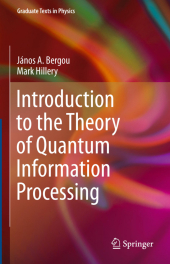 Neuerscheinungen 2015Stand: 2020-02-01 |
Schnellsuche
ISBN/Stichwort/Autor
|
HerderstraŖe 10
10625 Berlin
Tel.: 030 315 714 16
Fax 030 315 714 14
info@buchspektrum.de |

JŠnos A. Bergou, Mark Hillery
(Beteiligte)
Introduction to the Theory of Quantum Information Processing
2013. 2015. xi, 150 S. 15 SW-Abb. 235 mm
Verlag/Jahr: SPRINGER, BERLIN; SPRINGER NEW YORK; SPRINGER 2015
ISBN: 1-489-99843-8 (1489998438)
Neue ISBN: 978-1-489-99843-9 (9781489998439)
Preis und Lieferzeit: Bitte klicken
This course-tested book offers a consistent approach to the field, based on underlying fundamental principles of quantum theory, such as quantum measurements, no-cloning and no-signaling theorems and their consequences. Includes problems of varying difficulty.
Introduction to the Theory of Quantum Information Processing provides the material for a one-semester graduate level course on quantum information theory and quantum computing for students who have had a one-year graduate course in quantum mechanics. Many standard subjects are treated, such as density matrices, entanglement, quantum maps, quantum cryptography, and quantum codes. Also included are discussions of quantum machines and quantum walks. In addition, the book provides detailed treatments of several underlying fundamental principles of quantum theory, such as quantum measurements, the no-cloning and no-signaling theorems, and their consequences. Problems of various levels of difficulty supplement the text, with the most challenging problems bringing the reader to the forefront of active research.
This book provides a compact introduction to the fascinating and rapidly evolving interdisciplinary field of quantum information theory, and it prepares the reader for doing active research in this area.
Preface.- Introduction.- The Density Matrix.- Entanglement.- Generalized Quantum Dynamics.- Quantum Measurement Theory.- Quantum Cryptography.- Quantum Algorithms.- Quantum Machines.- Decoherence and Quantum Error Correction.- Index.
From the reviews:
"This textbook aims at providing graduate students with a compact introduction to the field. ... Every chapter starts with a well-written motivation to the topic and closes with a section containing exercises. The book is thus well suitable for graduate students and scientists specializing in quantum information. Beyond this, it may also serve as a reference for active researchers." (Gernot Schaller, zbMATH, Vol. 1278, 2014)


